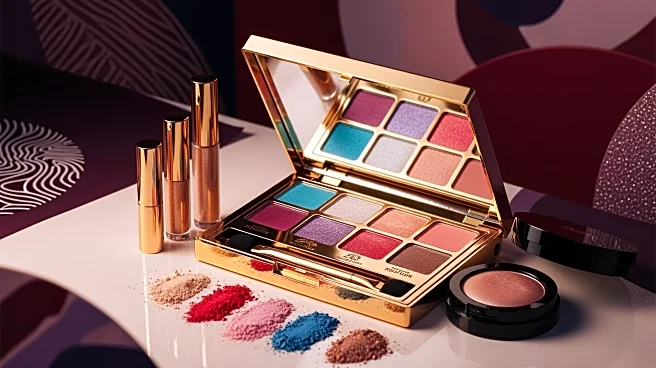What's Happening?
The beauty industry is experiencing significant growth in the Middle East, with the region becoming a key market for both start-ups and established international brands. According to Euromonitor International, the Middle East and Africa (MEA) beauty market was
valued at $44 billion in 2024 and is projected to grow at a compound annual growth rate (CAGR) of 16% through 2029, outpacing the global growth rate of 7%. This growth is driven by increased demand for fragrance, hair care, cosmetics, and skin care products. The 2025 edition of Beautyworld Middle East, the region's largest international trade fair for the beauty industry, highlighted this trend by featuring a wide array of exhibitors and a discovery zone for emerging brands.
Why It's Important?
The expansion of the beauty industry in the Middle East represents a significant opportunity for economic growth and diversification in the region. As the market continues to grow, it attracts international brands looking to capitalize on the rising demand for beauty products. This trend not only boosts local economies but also positions the Middle East as a pivotal player in the global beauty market. The increased interest in Arabian perfumes, as evidenced by a 60% rise in TikTok and Google searches, underscores the region's influence on global beauty trends. Companies that successfully tap into this market stand to gain substantial revenue and brand recognition.
What's Next?
As the Middle East beauty market continues to expand, more international brands are likely to enter the region, seeking partnerships with local distributors and retailers. The success of brands like Lattafa and Armaf, which have leveraged social media marketing to drive demand for Arabian perfumes, suggests that digital marketing strategies will play a crucial role in capturing market share. Additionally, the ongoing growth of the beauty industry in the Middle East may lead to increased investment in local manufacturing and innovation, further solidifying the region's status as a beauty industry hub.
Beyond the Headlines
The rapid growth of the beauty industry in the Middle East also raises questions about sustainability and ethical sourcing. As demand for beauty products increases, companies may face pressure to ensure that their supply chains are environmentally friendly and socially responsible. Furthermore, the cultural significance of beauty and fragrance in the region presents unique opportunities for brands to create products that resonate with local consumers while respecting cultural traditions.















